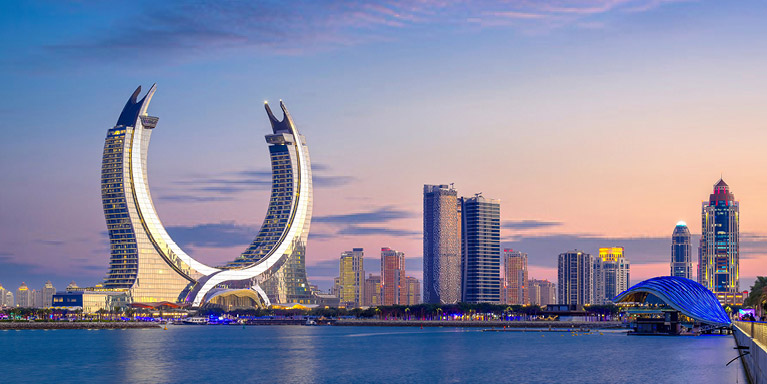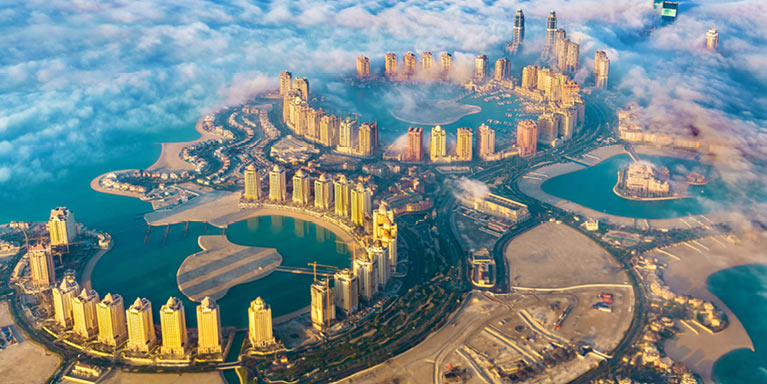
A guide to Qatar
Our expert view on expat life in an affluent and diverse Gulf country

Qatar’s economy is thriving, and the country has modernised rapidly without losing its rich heritage and conservative values. It may take some time for you to adapt, but English is widely spoken within the large expat community, which will help new arrivals feel at home.
In this guide, we’ll look at the things that are good to know to help you settle quickly into your new life. And, if you’re thinking of moving abroad, we’ll be by your side as you embark on your latest adventure.
- Population: 2.7 million
- Currency: Qatari riyal
- Capital: Doha
- Biggest city: Doha
- Main language: Arabic
- Main religion: Islam
- Political system: Constitutional monarchy
- International dialling code: +974
- Emergency services: 999
- Driving: On the right
-
Careers
Because of the large expat population, the business community has a wide range of cultures and working styles. It’s important to be adaptable and aware of local Qatari customs, which may be different to what you’re used to.
At the start of a meeting, business cards are often exchanged, so you might want to have some prepared in both English and Arabic. For expats, the most common greeting is a handshake. However, if you’re meeting a Qatari woman, you should wait for her to extend her hand first as she may not want to shake hands.
Small talk is an important part of Qatari culture, and it can take a long time for meetings to begin. The working week is different from many western countries and runs from Sunday to Thursday. The working hours might differ depending on the organisation but are often 7.30am to 12pm and 3.30pm to 7pm.
When working with Qataris, personal connections and networking are significant parts of the culture. This is called wasta or ‘who you know’. You should also be aware of the Qatarisation policy where companies must prioritise locals before expats. This can mean Qataris will be put first for promotions or training opportunities, but there are still many opportunities for expats.
Education
There are public schools, which are free for Qataris and teach in Arabic, but they’re difficult for expats to access. Instead, most expats send their children to private schools. The language and curriculum will depend on the school, so if you’re not planning to stay long term, this might help your child reintegrate when you return home.
The waiting lists for international schools are often long, so it’s worth looking at schools before your move. Private school costs differ by grade and school, but according to 2024 prices could set you back between 25,000 QAR and 70,000 QAR .
Another option is to homeschool your children. There aren’t homeschooling regulations in Qatar, so you should follow the laws and standards in your country.
-
Moving money
Putting the right banking arrangements in place is vital for expats around the world. You want to be able to access and transfer money easily, and with a bank you can trust to comply with international regulations. Most people have two banks – one in their home country and one local to where they’re living. But, if your bank has a global network, you may be able to set up an account ahead of your arrival, which gives you time to assess the financial market.
It’s important to understand how foreign exchange works and how fluctuating exchange rates can affect you. When you’re juggling finances in multiple currencies, remember that the currency markets can move quickly and make a big difference to the value of your money.
To help you reduce the risk of fluctuating currency, you could choose a foreign exchange that lets you fix an exchange rate for a fixed period. Then you’ll know exactly how much you need to convert, whatever happens in the market.
Budgeting
When you’re looking to move to a new country, you need to consider how a change in the cost of living could affect your finances. If you’re moving with your job, sometimes your employer may help with expenses, such as accommodation or school fees. Remember to account for setup costs, such as buying furniture and sorting insurance, when you’re thinking about your budget. Food can be expensive as much is imported, and the cost of leisure activities might also be higher than you’re used to. However, the cost of petrol might be cheaper.
Costs
Some of our offshore accounts have a monthly fee, such as the International Current Account, whereas others, like the Premier International Account, don’t. Both offer fee free International Payments (correspondent and recipient bank charges may apply) and 24/7 worldwide access. Plus, the Premier also includes worldwide travel insurance for you and your family, which is underwritten by AWP P&C SA and administered by Allianz Assistance, which is a trading name of AWP Assistance UK Ltd. Eligibility criteria, terms and conditions apply.
Financial planning
While it’s going to be a busy time, it’s also worth setting some time aside to review your financial plans, such as whether you want to open any offshore accounts. They offer the convenience of keeping your money in one place, so you can stay with the same bank no matter where life takes you.
Your expat status could give you new opportunities that weren’t available to you at home. However, tax rules differ from country to country, so if you’re unsure about your personal tax obligations, you should seek professional advice.
Lloyds Bank International Private Banking is by your side every step of the journey as you start your new life abroad. We offer international knowledge, experience and dedicated expert support to help meet all your financial needs. From savings to international payments and transfers, we can help you navigate the complex world of wealth management away from home.
Security
Offshore accounts are not protected by the Financial Services Compensation Scheme (FSCS), which protects savings up to £85,000 with authorised UK banks and building societies.
However, our accounts are covered by other schemes. The Jersey Bank Depositor Compensation Scheme, the Isle of Man Depositors’ Compensation Scheme and the Guernsey Banking Deposit Compensation Scheme offer protection for eligible deposits of up to £50,000.
Tax
Qatar charges income tax at a rate of 10%, and this applies to anyone making money in the country, whether you’re a resident or not. But there are many exemptions, which include salaries, wages, and allowances, as well as pensions and interest on savings. And, to prevent individuals being charged twice for tax, Qatar has non-double tax agreements with some countries, including the UK.
There is no inheritance or property tax to pay, but Qatar has recently begun charging VAT at a rate of 5%. There are exemptions, which include basic food items, healthcare, education, and other services.
Goods imported into Qatar are charged customs duty at a rate of 5%. However, tobacco and energy drinks are charged a special rate of 100% and it’s illegal to import alcohol and pork products into the country.
Corporate tax is applied at 10% on all profits, but companies owned by Qatari or GCC nationals are exempt. Self-employed income is included in this. Companies may need to pay a special rate of 35% if they have oil and gas operations.
Usually, there is no capital gains tax. However, it may be payable if non-Qataris have earned a profit from Qatari assets.
There is also a 5% withholding tax that applies to non-residents for income from services used in Qatar. It applies to commissions, royalties, technical fees and brokerage fees. It does not apply to dividends.
Taxes are organised by the General Tax Authority (GTA). The tax year runs from 1 January to 31 December and returns must be filed by the end of March. You’ll need a tax identification number (TIN) if you or your business needs to pay tax. You can get one from a GTA office or by registering for Dhareeba, which is Qatar’s online tax portal.
For more information about taxes in Qatar visit www.gta.gov.qa/en.
Accommodation
Expats tend to rent in Qatar as opposed to buying. It can be expensive, but you might find that utilities are cheaper, which may help to balance out the cost.
Your employer might provide you with accommodation as part of your contract, and they often choose villas in compounds. These are walled, with communal areas such as pools and community centres, which can be appealing if you have a family and want to live among other expats.
If you’re arranging your own accommodation, in 2024 the cost of a four-bedroom villa in a compound was around 15,000-20,000 QAR per month. Standalone villas are the most expensive option and apartments are the most cost effective. A furnished studio apartment could cost 4,000 QAR per month, but a furnished three-bedroom apartment in the more expensive areas could be as much as 13,000 QAR per month.
Not all expats organise their accommodation before they arrive, and serviced apartments are a popular option for those needing a base while they find a place to live. You’ll usually get housekeeping and room service, and you can rent them for however long you need, whether it’s a few days or even a few months.
Most expats live in Doha, but there are different neighbourhoods that might suit you depending on your circumstances. Al Waab, Madinat Khalifa and Abu Hamour are best suited to families looking for schools, amenities, and villas. Al Dafna is popular among expats who want to live close to the office, or in Al Sadd you’ll find lots of amenities, such as shopping centres and restaurants.
Rental contracts are usually for the year, and you’ll usually need to pay a deposit of around one month’s rent. If you use an agent, they often charge a fee, which could also be around one month’s rent. Plus, it’s common for landlords to ask you for post-dated cheques covering the entire length of your tenancy agreement upfront.
To secure your accommodation, you’ll usually need:
- Residence permit or visa
- Qatar ID card
- Copy of your passport
- Salary slip
- Post-dated cheques and deposit cheque.
Your contract will be written in Arabic, but you can have a version in English. You might want to hire a translator to make sure that all the details are correct in your version as some clauses can be strict. You’ll also need to bear in mind cultural rules, for example that unmarried couples won’t be able to rent an apartment together.
Arts
Qatar has museums, art galleries and heritage sites to visit for those interested in the history and culture of the country. The Museum of Islamic Art, the Arab Museum of Modern Art and the National Museum of Qatar are just some of the world-class museums in Doha. Not only that, but there’s a diverse range of local festivals for all interests, such as the International Kite Festival, Qatar Marine Festival, and the Doha International Book Fair.
The Doha Cultural Festival is a significant event. It takes place in March each year and features a range of activities and performances to help tourists and Qataris alike appreciate and learn more about the culture of the region. There’s something for everyone, with music, poetry readings and dances, as well as the opportunity to visit art galleries and fashion houses.
For those passionate about cinema, the Ajyal film festival shows films made in the region and encourages young people to get involved in the film-making industry.
Culture
Most Qataris are Muslim and, as an expat, it’s important to respect the Islamic faith and cultural rules. For example, expats aren’t expected to wear traditional dress, but there is a dress code that should be followed. In public men and women should wear clothes that cover their shoulders and knees. Bikinis and swimsuits can be worn on private beaches and in resorts where the rules allow, but they aren’t allowed on public beaches.
Small talk is important in Qatari culture but there are topics that are best avoided so that you don’t cause offence, such as religion and politics, particularly as it's a crime to criticise the emir. There are also certain gestures that you should take care not to make as they’re considered disrespectful. For example, a thumbs-up is offensive, as is using your finger to gesture someone over or to point someone towards something, and never show the soles of your feet.
Although there are many cultural and historical sites you might want to remember, be careful not to take pictures of other people or military buildings, as this can get you into trouble.
Displays of affection are illegal, such as kissing and hugging, and even holding hands can cause offence.
During Ramadan, those who follow the Muslim faith fast between sunrise and sunset. Expats aren’t expected to fast as well, but you shouldn’t eat and drink in public while others are fasting. Eid al-Fitr marks the end of Ramadan and is celebrated widely with circus shows, discount sales, and festivities at Katara Cultural Village.
Food
Due to Qatar’s large expat population, there are a growing number of restaurants in every cuisine. You’ll find Michelin-starred restaurants, rooftop bars and cafes in Doha.
Also, for those passionate about food, the Qatar International Food Festival takes place annually and features top chefs from around the world demonstrating on stage or giving masterclasses.
If you’d like to try the local cuisine, the national dish is machbῡs, a meal made up of rice, meat or seafood, and vegetables. Shawarmas are also popular and there are many affordable Indian restaurants in Qatar.
You’ll notice that people tend to eat later – as late as 10pm for the evening meal. And it’s also worth remembering that only five-star hotels are licensed to serve alcohol.
Health
Qatar has one of the best healthcare services in the Middle East with both public and private healthcare available. For citizens of the Gulf Co-operation Council (GCC) healthcare is free. Expats need to take out the Mandatory Visitors’ Health Insurance policy, which in 2024 costs 50 QAR per month and covers emergency care and transportation. You can also buy private health insurance from a company approved by the Ministry of Public Health (MOPH).
You should arrange insurance in advance as your visa won’t be approved and you won’t be able to enter the country without it. If you’re in Qatar for work, your employer should provide you and your family with health insurance.
Expats can apply for a health card to access public healthcare – this might be necessary even if you have private health insurance. In 2024, it costs 100 QAR, which you’ll need to pay at your local Primary Health Care Centre (PHCC).
Pharmacies are usually well stocked with common over-the-counter medications, but not all of them are open 24/7. However, not all common prescriptions will be available as some are banned or considered controlled substances. Make sure to check in advance that you’ll have access to any medication you need. If you bring your own medication, you should carry your doctor’s prescription.
Pets
To bring your pet to Qatar, you’ll need a pet passport, a pet import permit from Qatari authorities, and an international health certificate from a vet within 10 days of travelling. Plus, they’ll need to be vaccinated at least four weeks before travelling, have an RATT blood test, and be microchipped.
Qatar bans the import of certain breeds of animal, so it’s worth making sure that you’ll be allowed to bring your pet. It also doesn’t allow the import of animals from certain countries, including Russia, Ukraine, Jordan and Lebanon.
Shipping
Most expats choose to ship their belongings by sea as it’s cheaper than air freight, particularly for families shipping furniture and large amounts of belongings. The closest port to Doha is the Hamad Port in the Umm Al-Houl district.
However, the downside to sea freight is that it can take months for your items to arrive. Because many villas and apartments are available furnished, you might want to consider what option will be best for your budget.
Transport
The easiest and most popular way to get around Doha is by car due to the heat and convenience. You could ship your own car, but you might find it more cost effective to buy one when you arrive. Remember, you’ll be driving on the right, and visitors’ licences are valid for one week for rental vehicles. Before arrival, you could get an international driving permit, which will allow you to drive a rented car in Qatar for six months.
If you become a resident of Qatar, you can exchange your UK licence for a Qatari one, which will be valid for five years.
There are public transport options in the city too. You can travel on the Doha Metro, or the Msheireb Tram, and there are even buses and taxis that can take you around and outside of Doha. The 2024 price of a monthly bus ticket is between 100 QAR and 250 QAR, and the taxi fares start at 10 QAR with an extra 2.50 QAR per kilometre.
Lloyds Bank International takes no responsibility for the accuracy of this information. It is provided for orientation purposes and to stimulate further research, not as advice. We advise that you independently verify any details and make decisions based on your own assessment. It is crucial you are aware of and comply with any relevant laws in your host country or country of origin.

Doha
The capital city and most popular destination has stunning skyscrapers surrounded by sandy beaches and the clear blue water of the gulf sea. It offers the best in shopping, dining, events, museums and business. From delicious food to amazing architecture, Doha is a beautiful city to visit or live.

The Pearl
Pearl-Qatar is a man-made island located off the West Bay displaying a mixture of flamboyant architectural styles. From luxury yachts and impressive supercars to Michelin-star restaurants and top-rated schools, everything is designed to the highest standard to cater for expats’ needs.